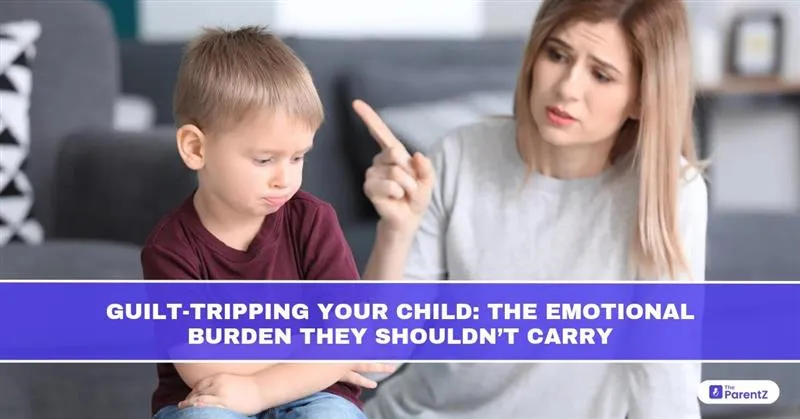When Love Feels Like Pressure
“You made me so upset today.”
“After all I do for you, this is how you treat me?”
“I gave up everything for you, and you can’t even listen for a minute?”
Statements like these are not uncommon in parenting, especially in moments of stress or hurt. But while they may seem like an honest way of expressing feelings, they often place the burden of adult emotions onto a child’s shoulders. This is known as guilt-tripping, a subtle form of emotional manipulation that makes children feel responsible for their parent’s feelings or sacrifices.
And it hurts more than we realise.
What Is Guilt-Tripping?
Guilt-tripping occurs when a parent tries to control a child’s behavior by making them feel guilty for not meeting expectations. It often involves reminding them of past favors, sacrifices, or disappointments to trigger compliance.
Unlike discipline, which focuses on guiding behavior, guilt-tripping focuses on emotional debt. The child is not being taught right from wrong; they are being taught that their love must be earned through obedience and emotional repayment.
How Guilt-Tripping Affects Children
1. Emotional Confusion and Shame:
Children don’t have the maturity to separate their actions from their self-worth. When they are guilt-tripped, they may begin to believe that they are bad for having needs, opinions, or boundaries. This creates a deep, silent shame.
2. Anxiety and People-Pleasing:
Kids who grow up with guilt as a behavioral tool often become overly anxious about upsetting others. They may become people-pleasers, sacrificing their own needs in fear of causing pain or disappointment.
3. Suppressed Authenticity:
When love feels conditional based on “how much trouble I cause” or “how grateful I am,” children learn to suppress their true feelings. They start saying what their parents want to hear, not what they really think or feel.
4. Damaged Parent-Child Bond:
While guilt-tripping might gain short-term compliance, it creates emotional distance. Over time, children stop sharing their problems or thoughts openly, fearing blame, judgment, or being made to feel ungrateful.
Cultural Context: A Common but Harmful Pattern
In many Indian families, guilt-tripping is passed down across generations. Parents who grew up with the same emotional conditioning often repeat it unknowingly. Sacrifice is romanticized, and gratitude is expected not just as appreciation, but as obedience.
Saying things like “I gave up my dreams for you” might come from a place of love, but when used to make a child feel guilty for making a mistake or choosing a different path, it turns love into pressure. Children begin to feel like they owe their life to their parents, not out of love, but out of emotional debt.
What Healthy Alternatives Look Like
1. Express Your Feelings Without Blame:
It’s okay to be hurt, disappointed, or upset, but own those emotions without placing the burden on your child. Say, “I felt sad when that happened,” instead of “You made me sad.”
2. Avoid Using Sacrifice as Leverage:
Your sacrifices are real and valuable, but they should never be used to guilt your child into obedience. Let your love be a foundation, not a bargaining chip.
3. Teach Responsibility With Respect:
When your child makes a mistake, address it with clarity and kindness. Focus on the behavior, not their character or how they’ve hurt you. For example: “I didn’t like that you spoke rudely. Let’s talk about what happened.”
4. Allow Space for Choices:
Let your child say no, express opinions, or have preferences even if they differ from yours. True respect in parenting is giving children the emotional freedom to be themselves without fear of guilt or rejection.
5. Reflect and Repair:
If you realize you’ve used guilt in the past, acknowledge it. A simple conversation like, “I think I’ve said some things that made you feel bad when you didn’t deserve to. I’m sorry,” can begin to rebuild emotional trust.
Final Takeaway: Let Love Be Free, Not Conditional
Children should never feel that love comes with emotional strings attached. Guilt-tripping may feel like a tool for control, but it builds emotional walls. It teaches children to seek approval rather than self-trust, and to feel weighed down by expectations rather than uplifted by encouragement.
Your child doesn’t need to carry the burden of your emotions to prove they love you. What they need is your presence, guidance, and forgiveness without shame, without guilt, and without conditions.
Let love be a safe space, not a scorecard. That is the heart of respectful parenting.





Be the first one to comment on this story.